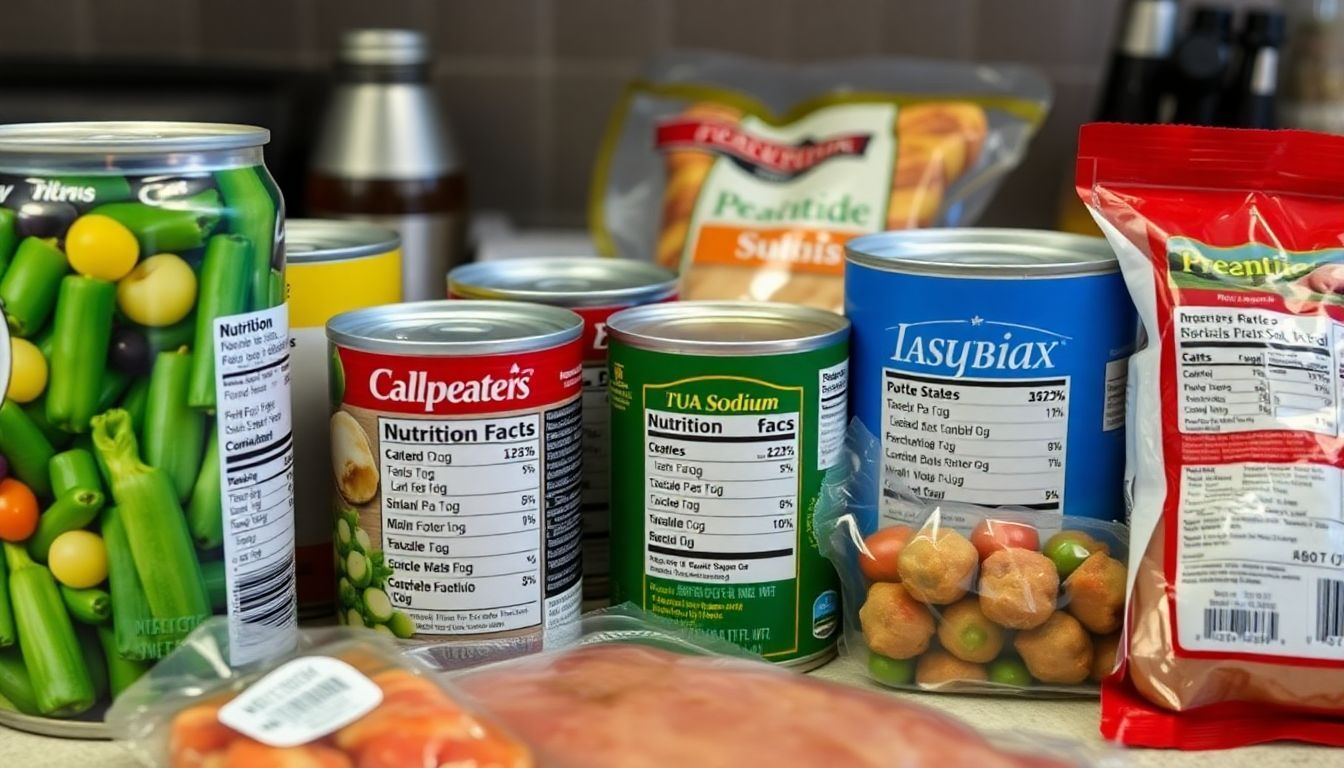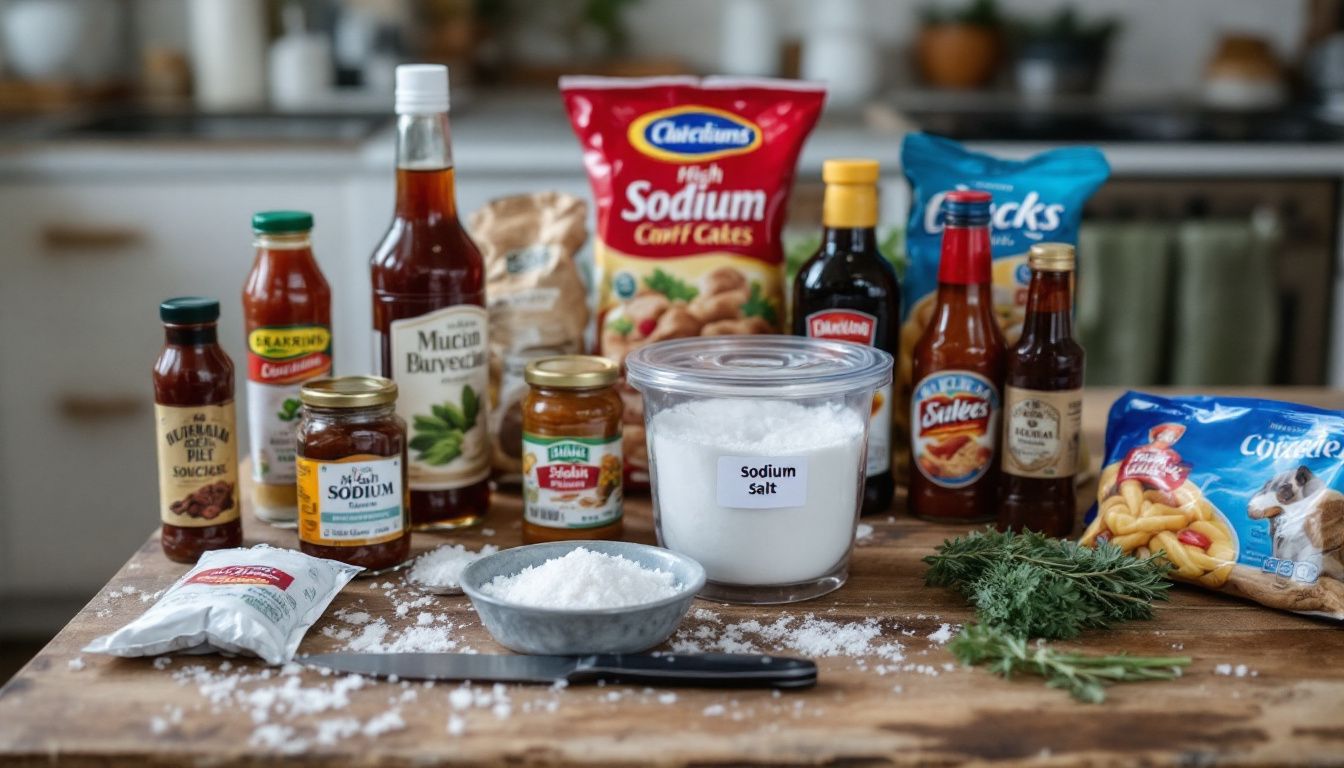Do you use too much salt in your meals without even realizing it? Most of the sodium we eat hides in packaged foods, sauces, and snacks. This blog will show simple ways to cut back on sodium for better heart health.
Thank you for reading this post, don't forget to subscribe!Keep reading to learn how a low-sodium diet can improve your life!
Key Takeaways
- Eating too much sodium raises blood pressure and risks heart disease, stroke, and kidney problems. Over 70% of salt comes from packaged foods and restaurant meals.
- Choose “low sodium” or “no salt added” foods. Rinse canned goods to cut sodium by up to 40%. Cook fresh meals instead of using processed items.
- Avoid salty snacks like chips or cured meats like bacon. Limit sauces with hidden salts like soy sauce or pasta sauce. Use herbs for flavor instead of table salt.
- Cutting back on sodium lowers high blood pressure, protecting the heart and reducing stroke risk in adults and children without harming kidneys or cholesterol levels.
The Impact of Too Much Sodium on Your Health
Eating too much sodium can harm your body. High sodium intake raises blood pressure, which increases the chance of heart disease and strokes. In fact, over 70% of the salt we eat comes from packaged foods, restaurant meals, and ready-to-eat items like bread or breakfast cereals.
This hidden salt adds up quickly without you realizing it.
Heart disease and stroke are leading killers in the U.S. Excessive sodium even risks kidney disease and other cardiovascular problems. Packaged foods such as canned vegetables or processed meats like cured turkey breast often contain loads of salt to preserve flavor and shelf life—so these may not always seem “healthy.” Lowering your daily sodium helps protect your heart health significantly.
“Reducing just a small amount of daily salt could save lives,” says studies on dietary habits worldwide.
Practical Tips to Reduce Sodium Intake
Too much sodium can harm your health. Here are simple ways to cut down on salt in your diet:
- Check food labels
Read nutrition facts labels carefully. Choose packaged foods marked as “low sodium” or “no salt added.” Keep daily sodium intake within the recommended limit. - Cook fresh meals
Use fresh vegetables, lean meats, and whole grains instead of processed foods. Avoid instant products, like boxed pasta or snack mixes. - Rinse canned goods
Rinse canned vegetables, beans, and other items before eating. This can reduce sodium content by up to 40%. - Reduce sauces and condiments
Limit soy sauce, pizza sauce, pasta sauces, and tomato sauce. These products often have hidden salts. - Add flavor with herbs and spices
Replace table salt with herbs like basil, oregano, or lime juice. Salt substitutes can also work well for extra flavor. - Be mindful when eating out
Ask for sauces on the side or choose grilled options over cured meats like bacon or rotisserie chicken. - Avoid salty snacks
Skip salty snack foods like chips and pretzels at the grocery store. Opt for options like plain yogurt with fruit instead. - Limit pickled or smoked items
Cut back on smoked sausages, pickled vegetables, and barbecued pork as they have high sodium levels.
Next is the benefits of lowering sodium in your diet…

Benefits of Lowering Sodium in Your Diet
Lowering sodium intake helps reduce high blood pressure. Adults eating less than 2 grams of sodium daily show a bigger drop in blood pressure compared to those eating more. This simple change protects your heart and lowers the risk of cardiovascular diseases like stroke or coronary heart disease.
Cutting down on sodium also benefits children, though changes in their blood pressure are smaller. A low-sodium diet doesn’t harm kidney function or cholesterol levels either. It supports better long-term health without unwanted side effects, making it important for everyone aiming for a heart-healthy diet.
Conclusion
Cutting back on salt can improve your health. Small changes, like using herbs and reading food labels, make a big difference. Enjoy fresh vegetables, whole grains, and heart-healthy flavors instead of salty snacks.
Your body—and your taste buds—will thank you!Eating less sodium today helps protect your heart tomorrow.
